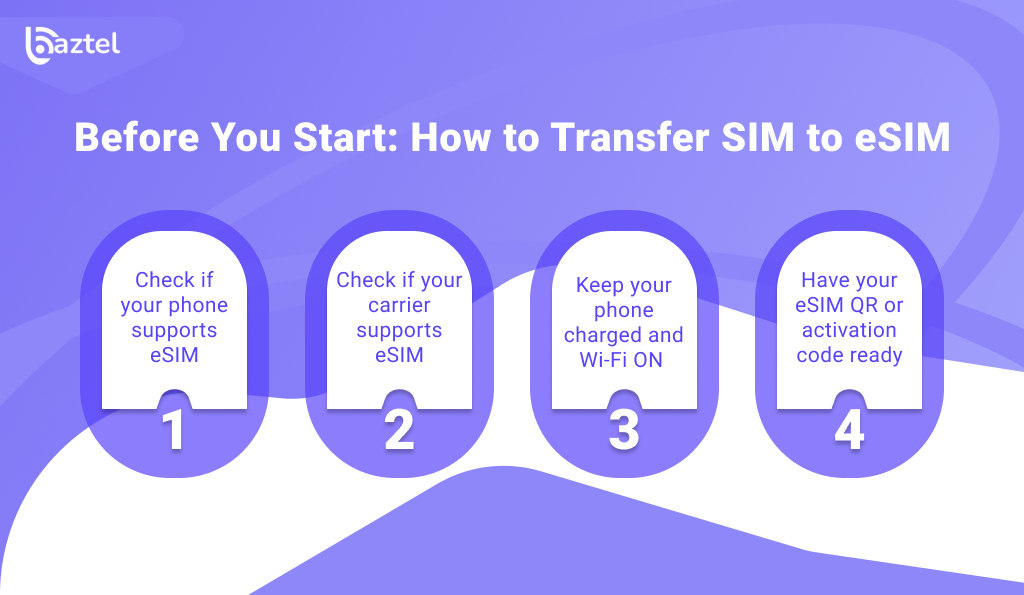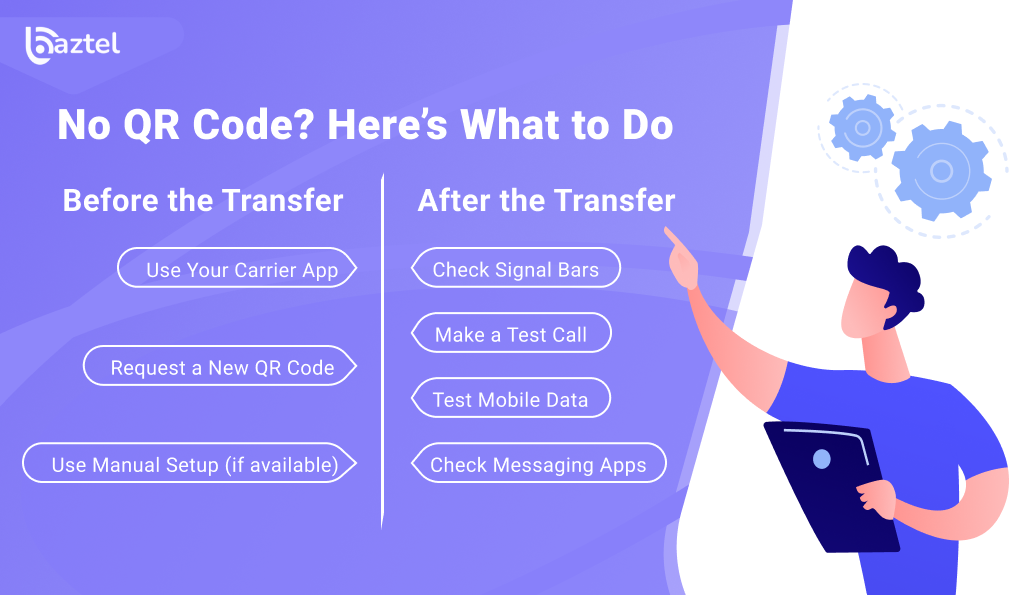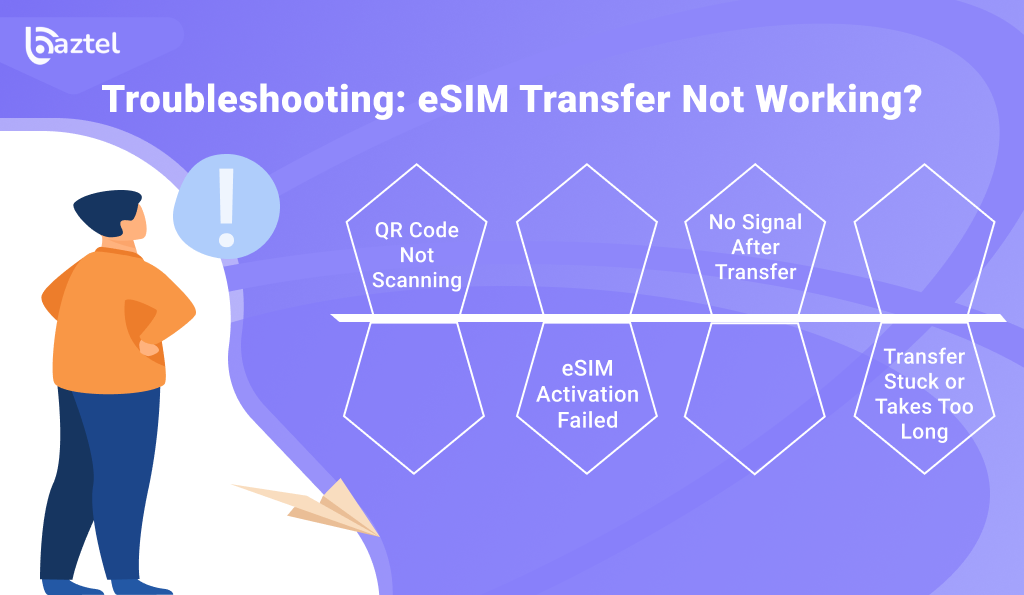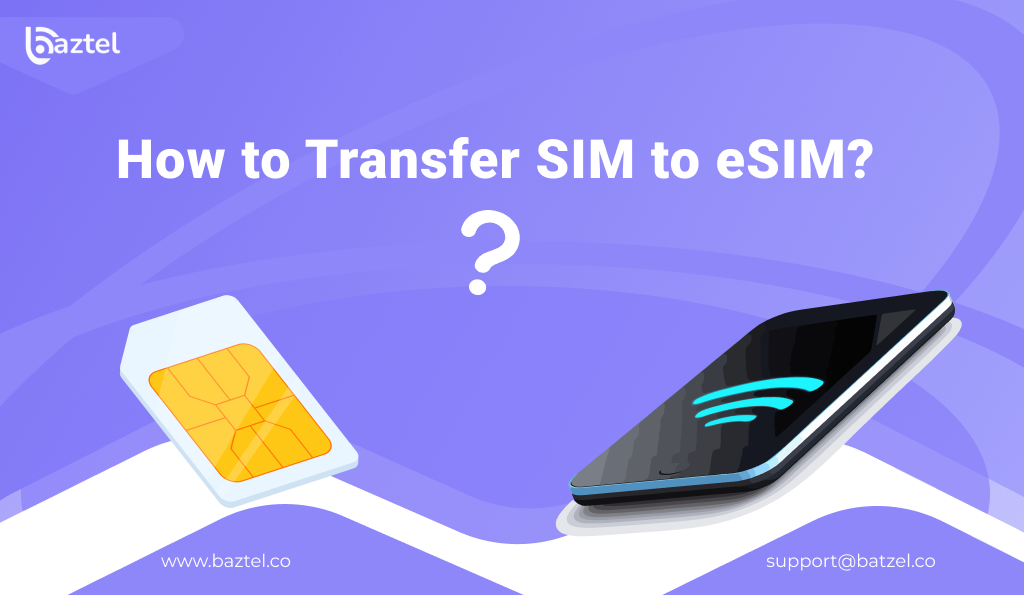If you’re looking for how to transfer SIM to eSIM, you’re not alone. A lot of people get stuck trying. Some don’t receive the QR code. Others scan it but the activation fails. And many have no idea what settings to tap.
We’ve seen all of it and we’ve helped users fix it. This step-by-step guide is built for regular people using iPhones, Android phones, or carrier apps.
We’ll also cover:
- What to do if the QR code never arrives
- What to check before starting
- Real fixes if transfer fails
- And how to confirm the eSIM is active
Want to know how eSIM works before switching? Start here for a beginner-friendly explanation.
Quick Answer: How to Transfer SIM to eSIM
Here’s a simple breakdown if you’re in a hurry:
iPhone:
- Go to Settings → Mobile Data → Add eSIM.
- Tap Transfer from Nearby iPhone or choose Use QR Code.
- Follow the steps, restart your phone.
Android:
- Open Settings → Connections → SIM Manager → Add eSIM.
- Choose Use QR Code or tap Enter Manually.
- Once activated, test mobile data and calls.
You’ve just done the main step of how to transfer SIM to eSIM.
Don’t remove your physical SIM until everything works fine.
Still waiting for your QR code? Read: How long does it take to activate eSIM?
Need to check if your phone supports eSIM? Use this device compatibility checker or visit GSMArena to confirm.
Before You Start: How to Transfer SIM to eSIM

Before you begin the SIM-to-eSIM transfer, there are a few things to check. Skipping these often leads to errors like “Activation Failed” or “eSIM not supported.”
Here’s what to confirm:
Check if your phone supports eSIM
Not all phones can use eSIM. You can check this in two quick ways:
- Dial *#06# → If you see an “EID” number, your phone supports eSIM.
- Or go to Settings → About → EID section.
Want a full compatibility list? Read our guide on eSIM-supported phones.
Still unsure? Use this official brand support page: Apple’s eSIM-compatible devices
Check if your carrier supports eSIM
Not every mobile operator supports eSIM and even if they do, some plans don’t allow transfer.
Do this:
- Visit your carrier’s website and look for eSIM support.
- Or check in their official app under “SIM settings” or “Add mobile plan.”
If you’re switching plans and unsure what to pick, this guide may help: How to switch between different eSIM plans
Keep your phone charged and Wi-Fi ON
Low battery or no internet = failed activation.
- Make sure your phone is above 30% battery.
- Connect to a strong Wi-Fi before starting.
Why? Because most eSIM profiles are downloaded over the internet, not your mobile data.
Have your eSIM QR or activation code ready
You’ll need one of these:
- A QR code sent by your carrier (email/SMS/app)
- An SM-DP+ address + activation code (manual entry method)
- Or direct setup through your carrier app
If your QR code hasn’t arrived or expired, here’s what to do:
See real fixes for QR issues even if you’re not in Europe, steps are the same.
Transfer SIM to eSIM on iPhone
Apple makes it fairly simple to shift from a physical SIM to eSIM. But your exact steps depend on how your carrier handles eSIM; some support Apple’s built-in “Quick Transfer,” while others send a QR code.
We’ll walk you through both.
Using eSIM Quick Transfer (iPhone to iPhone)
If you have your old iPhone and the new one nearby, Apple lets you move the number without any QR code.
Here’s how:
- Make sure both iPhones are updated and connected to Wi-Fi.
- On the new iPhone, go to: Settings → Mobile Data → Add eSIM
- Tap Transfer from Nearby iPhone
- On your old iPhone, confirm the transfer request.
- Wait a few seconds your number will move automatically.
- Restart your new iPhone and test with a call or mobile data.
Tip: You might see an option called Transfer from this number if you’re upgrading on the same device with a dual-SIM setup.
Need a detailed device compatibility list? Check supported iPhones on Apple’s eSIM guide
Using a QR Code from your Carrier
If your carrier sent you a QR code (email or app), follow this method:
- Open your iPhone’s Settings → Mobile Data → Add eSIM
- Tap Use QR Code
- Hold your second device (or printed code) in front of your camera
- Wait for the eSIM plan to load and activate
- Once done, restart your phone
To confirm if everything worked:
- Check if your iPhone shows signal bars next to the new eSIM
- Go to Settings → Mobile Data → make sure the line is turned ON
- Enable Data Roaming if needed
Transfer SIM to eSIM on Android
Android phones offer different eSIM options depending on your brand and model. Samsung, Google Pixel, and newer Android phones support both QR and manual setups.
Here’s how to go about it.
Samsung and Google Pixel Devices
Most recent Samsung Galaxy and Pixel models support direct eSIM setup via QR or manual entry.
- Open Settings → Connections or Network & Internet
- Tap SIM Manager or SIMs → Add eSIM
- Choose Scan QR code or Enter details manually
- Follow prompts to activate
- Restart your device
Not sure if your Android phone supports eSIM? See our quick eSIM compatibility guide
Using a QR Code
If your carrier gave you a QR code:
- Open Settings → SIM Manager → Add eSIM
- Tap Scan QR code
- Point your camera at the code (printed or on another screen)
- Let the phone download and activate the eSIM
- Restart your phone and test mobile data
Using Manual Entry (SM-DP+ Address)
Some carriers offer manual activation with an SM-DP+ address and an activation code.
Steps:
- Open Add eSIM → Enter details manually
- Input the SM-DP+ server address
- Enter your activation code
- Follow prompts until profile installs
- Restart your phone
If you’re using a global eSIM provider, the SM-DP+ address is usually listed on their support page or welcome email.
Want to explore global eSIM plans that support manual setup?
Confirm the eSIM is Active
After setup, do a quick check:
- Make sure signal bars are showing
- Go to Settings → SIM Manager
- Set your new eSIM as the default for mobile data
- Turn on Data Roaming if you’re travelling
Still not working? Don’t panic, we’ll fix it in the next section.
No QR Code? Here’s What to Do

Many users get stuck at this point:
The eSIM QR code never arrives. Or it expires. Or the link opens and vanishes.
Here’s what you can do instead.
Option 1: Use Your Carrier App
Most telecom companies now support eSIM transfer directly through their mobile apps.
Steps:
- Download your carrier’s official app
- Log in with your number or customer ID
- Look for eSIM activation or Add mobile plan
- Follow the steps no QR needed
If you’re traveling or using an international eSIM, check this guide instead: Best eSIM cards for international travel
Option 2: Request a New QR Code
If you didn’t get the QR or it expired you can request a fresh one.
- Go to your carrier’s website
- Find the eSIM support or replacement SIM section
- Request a new QR code or SM-DP+ activation details
Some carriers send QR codes via email or inside your account dashboard.
Still waiting? Learn how long it usually takes here: How long does it take to activate eSIM?
Option 3: Use Manual Setup (if available)
Ask your carrier if they support manual activation using:
- SM-DP+ server address
- Activation code
These details can be entered manually (on both iPhone and Android), even without a QR.
Most international providers like Airalo, Nomad, or Maya Mobile give this option.
For full steps, scroll back to the Android or iPhone manual setup method.
After the Transfer
Once your eSIM is active, you need to confirm everything is working. Just because the profile installed doesn’t always mean calls or mobile data will work right away.
Here’s what to check.
Step 1: Check Signal Bars
Look at the top of your phone screen. You should see:
- Signal bars for the new eSIM line
- Carrier name (in some cases)
- No “No SIM” or “SOS” error
Still seeing no signal? Restart the phone once.
Step 2: Make a Test Call
Try calling any local number to test voice functionality. If the call doesn’t go through:
- Open Settings → Mobile Data or SIM Manager
- Make sure your new eSIM is enabled
- Check if Voice Line is set to the eSIM (iPhone)
Need help switching between voice lines or data plans later? See how to switch between eSIM plans.
Step 3: Test Mobile Data
Open a website or app to check data is working. If it’s not:
- Go to Settings → Mobile Data / SIM Settings
- Set your eSIM as Default for Mobile Data
- Turn Data Roaming ON if you’re abroad
Still slow or no data? You might be on a plan without the internet. Check travel eSIM options with data.
Step 4: Check Messaging Apps
Some apps like WhatsApp or iMessage may still show your old SIM.
Do this:
- Open WhatsApp → Settings → Tap your number
- Tap Change Number if needed
- For iMessage: Go to Settings → Messages → Send & Receive → Check your eSIM number
This ensures your messages and backups stay linked to the right number.
Troubleshooting: eSIM Transfer Not Working?

Even after doing everything right, eSIM activation can fail. Maybe the QR doesn’t scan. Maybe the profile installs but no signal shows up.
Here’s how to fix the most common problems.
QR Code Not Scanning
You open the camera, but nothing happens. Or it gives an error.
Try this:
- Brighten your second screen or paper print
- Hold the phone straight, not at an angle
- Clean the camera lens
- Don’t zoom in use default distance
eSIM Activation Failed
This error usually means:
- Your internet connection is weak
- The QR code is expired
- The carrier plan is inactive
Fix:
- Reconnect to strong Wi-Fi
- Restart the phone
- Request a fresh QR code from your carrier
No Signal After Transfer
If you’ve completed all steps but see no signal bars:
- Go to Settings → Mobile Data / SIM Manager
- Ensure the eSIM line is turned ON
- Select it as the Default for Mobile Data
- Turn on Data Roaming (especially if abroad)
- Try restarting again
Still confused between eSIM lines? Learn how to switch between eSIM plans
Transfer Stuck or Takes Too Long
Sometimes, the screen freezes or gets stuck during activation.
What to do:
- Wait 5–7 minutes before closing the setup screen
- Force restart the phone
- Try setting up the eSIM again from scratch
Pro Tip: If the setup fails twice, switch to the carrier app method. It’s often more reliable.
Conclusion
Learning how to transfer SIM to eSIM might sound technical at first, but once you get the basics right, it’s actually quite easy. You just need to check if your phone supports eSIM, make sure your carrier allows it, and follow the right method: QR code, manual setup, or carrier app. Whether you’re using an iPhone or Android, the steps are mostly straightforward if you have everything ready. Just don’t remove your old SIM until you’ve tested calls, mobile data, and messaging apps. And if anything goes wrong, you already have all the fixes listed above. Save this guide it’ll help you or someone you know switch smoothly.
Frequently Asked Questions
Can I transfer my SIM to eSIM without going to a store?
Yes, most carriers now support eSIM transfers online or through their app. You can either scan a QR code or follow in-app steps.
Will my WhatsApp or contacts be affected during transfer?
No. Your contacts and WhatsApp will stay the same. But on some phones, you may need to reselect your number in WhatsApp settings.
Can I move from eSIM back to a physical SIM later?
Yes, but only if your carrier allows it. Some may charge a small fee. You’ll need to request a physical SIM card from your operator.
How long does it take to activate an eSIM?
Usually between 5 to 15 minutes. Some providers activate instantly, while others take longer depending on network traffic or verification.
Do I need the internet to transfer SIM to eSIM?
Yes. A strong Wi-Fi or mobile internet connection is needed to download your eSIM profile. If your internet drops, the activation may fail.
What if my phone says “eSIM is not supported”?
First, check if your phone model supports eSIM. If it’s supported but still not working, your phone may be carrier-locked.
Can I use the same eSIM in multiple phones?
No. eSIMs are usually locked to one device at a time. To move it, you’ll need to delete it from the old phone and request a fresh QR or activation code.
Blog Author
Peter
Peter started BazTel.co to make mobile internet easier for travellers. He noticed how tough it was to find good network options while visiting new countries. That’s when he built BazTel — a place where anyone can buy eSIMs online without confusion or long steps. He believes tech should be simple and useful, not complicated. When he’s free, he likes to travel, test BazTel himself, and keep improving it based on real user problems.

 Botswana
Botswana Zambia
Zambia Congo
Congo Colombia
Colombia China mainland
China mainland Chile
Chile Chad
Chad Central African Republic
Central African Republic Canada
Canada Cameroon
Cameroon Cambodia
Cambodia Burkina Faso
Burkina Faso Bulgaria
Bulgaria Brunei Darussalam
Brunei Darussalam Brazil
Brazil Aland Islands
Aland Islands Bosnia and Herzegovina
Bosnia and Herzegovina Bolivia
Bolivia Belgium
Belgium Belarus
Belarus Bangladesh
Bangladesh Bahrain
Bahrain Azerbaijan
Azerbaijan Austria
Austria Australia
Australia Armenia
Armenia Argentina
Argentina Algeria
Algeria




